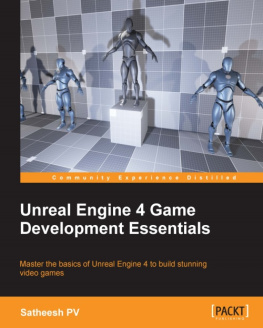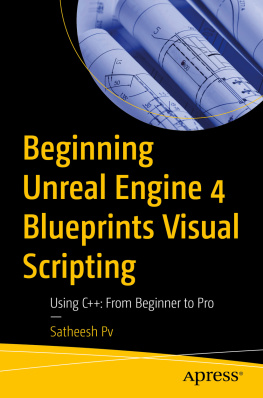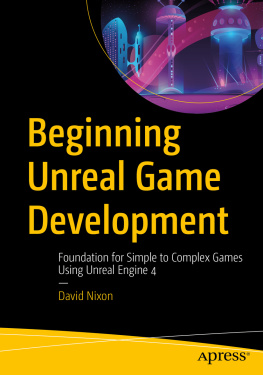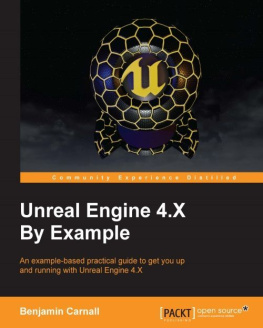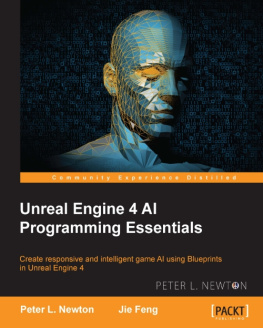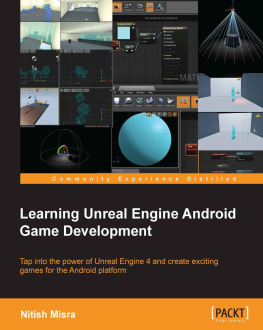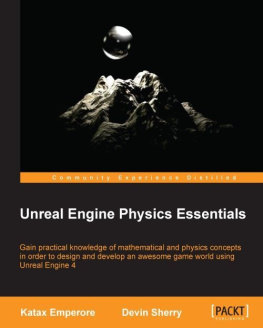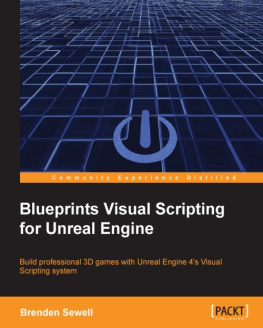Acknowledgements
I am using this opportunity to thank God for giving me talent and a wonderful family, who are my real inspiration. I am grateful to them for their aspiring guidance and continuous support while writing this book. I am thankful to Epic Games for giving out such an amazing Engine to the world for free! You guys are the best!
I express my warm thanks to my fiance Gale Fernandes; without her amazing support and constructive criticism, this book possibly would not have happened.
I would also like to thank my brother Rakesh PV for introducing me to the world of games and game technologies. It is through him I learned everything related to games and I am proud to say that he is my first mentor.
I wish to extend my deep thanks and gratitude to my good friends Alexander Paschall (Epic Games) and Chance Ivey (Epic Games) and also to my best friend Reni Dev, with whom I created my first game.
I also wish to thank my dear friend and C++ mentor, Nathan Iyer (Rama) for his great support. With his amazing articles and examples on C++, he has taught many (including me) in the Unreal Community. He was kind enough to review my C++ chapter, point out mistakes and gave honest feedbacks including spending his valuable time to remove some technical discrepancies. Thank you so much Rama! You can visit his website at: http://ue4code.com/
Finally, I would like to thank Vasundhara Devi and Lucy Fernandes for giving me all those joyous moments that put a smile on my face. Thank you moms! I love you.
About the Reviewer
Omer Shapira is an artist, software developer, and virtual reality researcher. He has worked on Game Engine projects for Nike, Google, Microsoft, Disney, Universal Pictures, and Samsung. His projects and collaborations have been exhibited at Sundance Festival, The Atlantic, The New York Times, The Guardian, Wired, Adage, and Eyebeam, and have won awards from Tribeca Film Festival, Ars Electronica, the Art Directors Club, and The Webbys.
Omer is currently head of virtual reality and game engines at Fake Love, an experiential design studio. Previously, he worked as a developer at Framestore, The NYU Media Research Lab, and the MIT Media Lab, and as a filmmaker and VFX artist for Channel 10. Omer studied mathematics at Tel Aviv University and human-computer interaction at New York University.
Omer's four-dimensional video game, Horizon (written in Unreal Engine), will be released in 2017.
You can find him at omershapira.com.
I'd like to thank the people who contributed the most to my ability to write game engines: Ken Perlin, Casey Muratori, Jonathan Blow, Fred Ford, and Paul Reiche III.
I'd like to thank Surya Mattu and Jenn Schiffer for being good parents, and my cat, Nitzu.
www.PacktPub.com
eBooks, discount offers, and more
Did you know that Packt offers eBook versions of every book published, with PDF and ePub files available? You can upgrade to the eBook version at > for more details.
At www.PacktPub.com, you can also read a collection of free technical articles, sign up for a range of free newsletters and receive exclusive discounts and offers on Packt books and eBooks.
https://www2.packtpub.com/books/subscription/packtlib
Do you need instant solutions to your IT questions? PacktLib is Packt's online digital book library. Here, you can search, access, and read Packt's entire library of books.
Why subscribe?
- Fully searchable across every book published by Packt
- Copy and paste, print, and bookmark content
- On demand and accessible via a web browser
Preface
The purpose of Unreal Engine 4 Game Development Essentials is to teach people interested in using Unreal Engine how to create video games. You will learn what Unreal Engine is and how to download and use it. From there, we will go through the collection of tools available in Unreal Engine 4 including Materials, Blueprints, Matinee, UMG, C++, and more.
What this book covers
, Introduction to Unreal Engine 4 , is where we begin our journey on Unreal Engine 4 Game Development Essentials . In this chapter, the reader will learn how and where to download Unreal Engine as well as the difference between the source version and launcher version. After the Engine's installation (or compilation, if it was the source version) we will get comfortable with the user interface of Unreal Engine. We will also learn about the basics of Content Browser, BSP, and how to change the splash screen and the icons for your game.
, Importing Assets , teaches how to import your custom FBX assets into Unreal Engine once we get the Engine up and running. You will learn about collisions, materials, and the level of detail.

